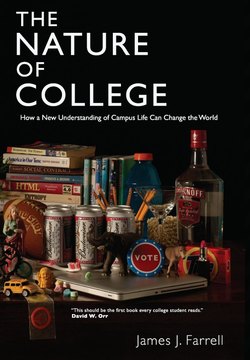Читать книгу The Nature of College - James J. Farrell - Страница 20
На сайте Литреса книга снята с продажи.
Sacred Time
ОглавлениеWhether or not gods exist, people and cultures feel a supernatural relationship to the natural world. It may be Allah or Yahweh, the Corn Mother or the Rainbow Serpent, but many people believe that something supernatural creates the world, and that our time on Earth is a divine gift in a purposeful cosmos. For example, the Bible suggests that the universe is the work of a creator, and that time is God’s gift, so that an individual’s time is not just hers, but God’s as well. If that’s true, perhaps Thoreau was right when he claimed that you can’t kill time without injuring eternity.9
Many religious traditions structure time to point to such supernatural connections. In earlier Christian cultures, people told (and literally tolled) God’s time with Angelus bells, which provided a religious frame for the day by calling people to prayer morning, noon, and night. In contemporary Islamic cultures, people orient themselves toward Mecca and pray at appointed times. All over the world, people are called to recognize the holy at traditional times in everyday life. But when bells ring at American colleges today, few students turn to prayer or contemplation. Sacred time used to be a moment for people to consider how to “redeem the time”—how to make ordinary time extraordinary, luminous with possibilities for good. Calls to prayer and holidays made time for people to listen to the sacred, and to apply the wisdom of holiness to their everyday lives. Although many religious Americans—and some college students—still take time for prayer and church services, we often see these rituals as perfunctory obligations, rather than as an opportunity to imagine a better world. For most college students, Sunday is just the second day of the weekend. On campus, it’s the day to recover from Saturday’s bacchanalian rituals and—in the evening—to start reading for next week’s classes. But it could be different.10
We could break out of our commonsense construction of time to discover new connections between past and future, nature and culture. Alarmed by the presentism and parochialism of America’s culture of time, we could begin timely conversations that would help us reshape our personal and cultural perspectives on how to live sustainably for all time. Such a movement to consider time—the past, the present, the future, the natural, and the sacred—in its entirety, could literally save all time.
